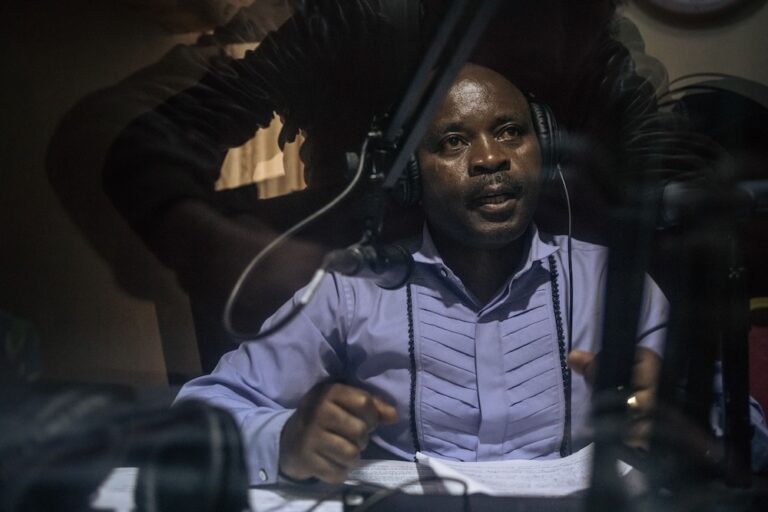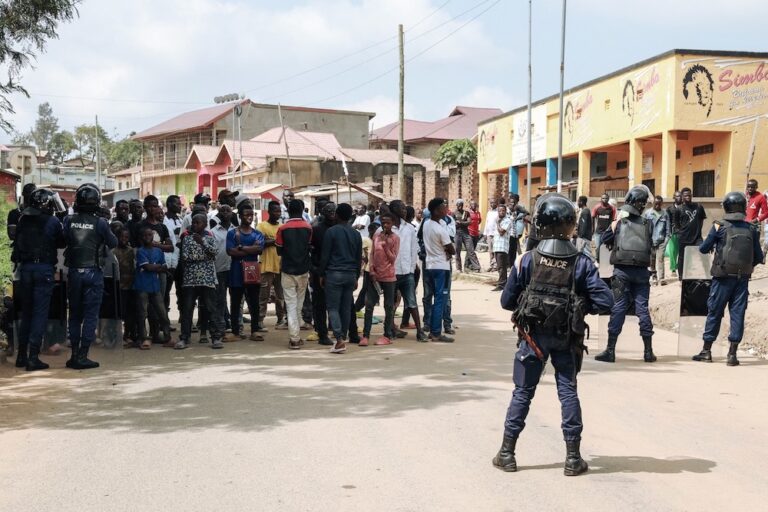(JED/IFEX) – In an 18 October 2002 letter to Human Rights Minister Ntumba Luaba, JED expressed its serious concern following the abduction and torture of Sébastien Kayembe Nkokesha, chairman of the board of directors of the Congolese Human Rights Observatory (Observatoire Congolais des droits de l’homme, OCDH) and a Kinshasa-based lawyer. “For once, JED would […]
(JED/IFEX) – In an 18 October 2002 letter to Human Rights Minister Ntumba Luaba, JED expressed its serious concern following the abduction and torture of Sébastien Kayembe Nkokesha, chairman of the board of directors of the Congolese Human Rights Observatory (Observatoire Congolais des droits de l’homme, OCDH) and a Kinshasa-based lawyer. “For once, JED would like to see the government demonstrate that its commitment to human rights in the DRC is more than just words designed to appease the outside world. As such, JED urges you to consult with the State Prosecutor’s Department, see to it that an investigation is launched into this incident, and that the perpetrators of the attack and those behind it are punished in accordance with the law,” JED wrote.
Kayembe states that he was abducted on 15 October at about 3:00 p.m. (local time) in downtown Kinshasa, by armed and uniformed men. He was taken by force to Maluku (about 50 kilometres east of Kinshasa), where he was sprayed in the eyes with an unidentified liquid and beaten with iron rods. He was then taken to Kimbondo, along the road to Lower-Congo, where he was left for dead. His burned-out car was found in Maluku 24 hours later. His attackers, including an unnamed colonel, reportedly accused him of being “the devil’s lawyer” and “representing people who killed Mzee [former president Laurent Désiré Kabila].”
Kayembe represents journalists Delly Bonsange and Raymond Kabala, who received heavy prison sentences and fines for having levelled “harmful accusations” against Security and Public Order Minister Mwenze Kongolo. They were also convicted of “writing falsehoods” because of an error in an address published in their newspaper, “Alerte Plus”. During their trial, Kayembe unsuccessfully sought to have the court prosecute members of Minister Kongolo’s cabinet, whom Kabala accused of torturing him in the ministry’s offices, before his transfer to Kinshasa’s Penitentiary and Re-education Centre (Centre Pénitentiaire et de rééducation de Kinshasa, CPRK). A few months ago, to mark International Day Against Torture, the OCDH had strongly denounced the daily acts of torture that are common in the Democratic Republic of Congo. A serious debate also took place at the time, particularly with the security and public order minister’s cabinet, concerning the torture inflicted on Kabala.
Kayembe is also on the team of lawyers representing the presumed killers of former president Laurent-Désiré Kabila. Their trial is still underway at the CPRK. Kayembe is physically unable to exercise his profession because of the injuries he sustained during the attack. This comes as a verdict is expected soon in the two journalists’ appeals trial. Of the 130 suspects detained in the context of the trial of former president Kabila’s presumed killers, the prosecutor, Colonel Charles Alamba, is seeking 115 death sentences.


